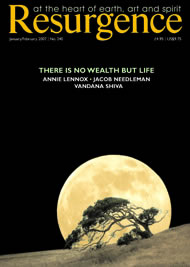THE SUBTITLE OF this book prompts the obvious questions: what kind of trade, what kind of development? With one of the authors a former Chief Economist to the World Bank, most readers of Resurgence will suspect that they can guess the answers that are coming. Interestingly, however, although assuming the ultimate desirability of a global, free-trade economy, the conclusions reached suggest that that framework is rapidly becoming unworkable. For that reason alone it will be of interest to those who wish to understand the logic of a system that is propelling us towards disaster.
In September 2003 the meeting of development ministers in Cancún, Mexico collapsed amid accusations that the developed countries were reneging on agreements negotiated at Doha less than two years earlier. In the light of that failure the authors were asked by the Commonwealth countries to consider “What would a true development round – one reflecting the interests and concerns of the developing world – look like?” After reviewing the theoretical and empirical evidence of existing and proposed agreements they conclude that, from the perspective of the developing nations, the debate about whether the world should move towards free trade is secondary to issues specific to each and every country’s journey towards trade liberalisation.
That leads them to a discussion about the conditions in which such complexity might be managed through global institutions. Accepting that the World Trade Organization is essentially a mercantilist institution that operates on the basis of self-interested bargaining, with deals done behind closed doors, they suggest that future development rounds should be based on generally agreed principles that embody the concept of ‘fairness’. It is a hopelessly naive concept and it gets worse. To deal with one nation’s notion of fairness being inevitably perceived as a rip-off by another, the argument suggests a kind of legal aid that will allow the poorest countries to successfully challenge the many ways in which the economically strong protect their own interests while demanding concessions from others. There is also the plea that provisions should be inserted in future agreements to prevent the ‘race to the bottom’ that is so characteristic of trade today, and that the environmental pollution associated with unfettered competition should be considered a form of subsidy and prohibited.
When that agenda is placed alongside the realities quoted elsewhere in the book – for example, that farm subsidies in the Organisation for Economic Co-operation and Development (OECD – the group of the most powerful developed countries) for the year 2003 were equivalent to 48% of all agricultural production, down just three percentage points from 51% in 1986–8, despite all the development rounds in between – you understand the nature of the beast and that it is incapable of changing its spots however much it may grin and claim it is seeking only fairness. To try and tame it is as futile as Canute’s attempt to turn back the tide. Meanwhile, the planet and its people, especially the poorest, are suffering untold injury.
There is little mention of global warming and none of peak oil; or of the part that the West’s insatiable appetite for consumption is playing in the further impoverishment of the world’s poorest nations. Trading in arms, drugs and people are seen as aberrations in the fabric of free trade rather than the inevitable consequence of the rapacity and greed on which it is constructed. A conclusion that weakly suggests the need for “a co-ordinated and well-financed international effort” to develop physical and institutional infrastructures and compensate those adversely affected by such “progress” shows how close we are to realising that the emperor has no clothes. Perhaps then we will be able to concentrate on the true goals of development in which local people are empowered to take responsibility for themselves and the particular piece of the Earth they occupy. When that happens we will talk of mutual trade, not free trade, and it will, by definition, be fair.
Chris Wright is an author and founding member of Action for Sustainable Living. www.afsl.org.uk







